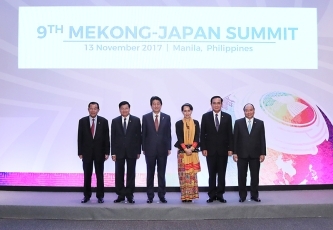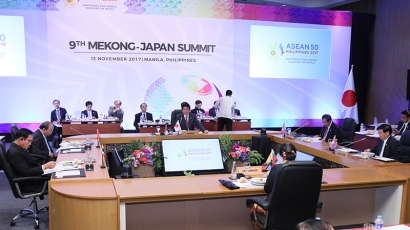Asia
The Ninth Mekong-Japan Summit Meeting
November 13, 2017
 Photo: Cabinet Public Relations Office
Photo: Cabinet Public Relations Office
 Photo: Cabinet Public Relations Office
Photo: Cabinet Public Relations Office
On November 13, commencing at 10 p.m. (local time) for approximately 60 minutes, the Ninth Mekong-Japan Summit Meeting (the Mekong-Japan Summit) was held in Manila, the Republic of the Philippines. The Summit was attended by Mr. Shinzo Abe, Prime Minister of Japan, who served as Chair. The overview of the meeting is as follows. (The attendees from the Mekong countries are listed at the end).
Joint Statement(PDF)

1 Opening Remarks
Prime Minister Abe, the Chair, stated the following:
(1) Promoting cooperation with the Mekong countries, whose economies continue to grow rapidly, is extremely important. Cooperation under the “New Tokyo Strategy 2015 for Mekong-Japan Cooperation,” which has entered its second year, is producing results, and Japan hopes to continue to move forward with the intent of developing together with the Mekong.
(2) Along with further contributing to the industrial development in the Mekong region through public-private partnership, Japan hopes to contribute to the region by utilizing Japan’s expertise in areas such as human resources development, health and medical care and environmental technologies, in addition to the development of “quality infrastructure” that conforms to international standards.
(3) This year marks 25 years since Japan’s first full-scale participation in a Peacekeeping Operation (PKO) in Cambodia, and Japan will continue to contribute to the peace, stability and prosperity of the Mekong region under Japan’s policy of “Proactive Contribution to Peace.” Japan also intends to proactively cooperate with the Mekong countries in order to promote its Free and Open Indo-Pacific Strategy.
(1) Promoting cooperation with the Mekong countries, whose economies continue to grow rapidly, is extremely important. Cooperation under the “New Tokyo Strategy 2015 for Mekong-Japan Cooperation,” which has entered its second year, is producing results, and Japan hopes to continue to move forward with the intent of developing together with the Mekong.
(2) Along with further contributing to the industrial development in the Mekong region through public-private partnership, Japan hopes to contribute to the region by utilizing Japan’s expertise in areas such as human resources development, health and medical care and environmental technologies, in addition to the development of “quality infrastructure” that conforms to international standards.
(3) This year marks 25 years since Japan’s first full-scale participation in a Peacekeeping Operation (PKO) in Cambodia, and Japan will continue to contribute to the peace, stability and prosperity of the Mekong region under Japan’s policy of “Proactive Contribution to Peace.” Japan also intends to proactively cooperate with the Mekong countries in order to promote its Free and Open Indo-Pacific Strategy.
2 Mekong-Japan Cooperation
(1) Prime Minister Abe made the following comments with regard to Mekong-Japan cooperation:
- In 2015 Japan pledged 750 billion yen of Official Development Assistance (ODA) support over three years in order to realize quality growth, and it has already implemented two-thirds or more of that ODA. Over the past year Japan has advanced cooperation relating to infrastructure development such as Cambodia’s Sihanoukville Port, Myanmar’s Yangon-Mandalay railway, and Thailand’s high-speed railway.
- Japan is contributing to the development of “quality infrastructure,” but is simultaneously moving ahead with expediting yen loans, and hopes the Mekong countries’ governments will also undertake initiatives to expedite this process.
- Strengthening soft connectivity is the key to reducing distribution costs and facilitating trade within the region. Japan intends to place added emphasis on the three areas of institutional development, human resources development and regional development in order to realize “vibrant connectivity.” Japan is also in the process of preparing an opportunity to invite specialists from each country to Japan to have them deepen their expertise in the near future.
- Japan will also strengthen industrial connectivity, including through verification projects for improving productivity at manufacturing sites using IOT (the Internet of Things). Japan intends to support the generation of new added value and greater industrial sophistication in the region.
- Japan intends to pursue new cooperation in order to achieve green growth, including realizing low-carbon societies and sustainable cities, and disseminating environmental infrastructure for building recycling societies. Japan hopes to cooperate to promptly establish the Southeast Asia Disaster Risk Insurance Facility (SEADRIF) for disaster risk in order to mitigate the impact of natural disasters and climate change.
- Japan has drawn on its own experiences to set up the “Asia Health and Well-being Initiative” in order to promote a regional comprehensive care system and independence support-type care. Japan intends to broaden this to the Mekong countries in the future.
- In cultural and people-to-people exchanges Japan will also place greater emphasis on artistic and cultural exchanges and Japanese language education, including by training instructors.
- Japan welcomes progress in cooperation with Thailand on developing the Mekong region. Japan also intends to advance cooperation with Asian Development Bank (ADB) in this region in the future.
- We are grateful for Japan’s support for the Mekong region. We welcome the steady progress with the New Tokyo Strategy 2015, and highly appreciate that two-thirds or more of the 750 billion yen of ODA support has already been implemented. In addition, we appreciate that cooperation is taking shape through a variety of frameworks and initiatives such as the action plan based on the “Mekong Industrial Development Vision,” and the “Japan-Mekong Connectivity Initiative.”
- We support initiatives that are based on Japan’s “Free and Open Indo-Pacific Strategy,” and hope that will also contribute to strengthening connectivity. We appreciate that as a result of Japan’s support, land routes, ports and airports are being established and the region’s connectivity is being strengthened both on the “hard” and “soft” aspects, and hope for cooperation in the future. Where routes are concerned, establishing the Vientiane-Hanoi highway is a priority field, and we hope for Japan’s cooperation. Where soft connectivity is concerned, we attach importance to cooperating on preparing a “single window” in order to reduce distribution costs.
- Japan’s cooperation is contributing to incorporating an intraregional industrial value chain into the Mekong region. We also hope to cooperate on making the region’s industries more sophisticated. Human resources development is also important, and we appreciate that over one year from 2016, 12,000 people in the Mekong region are being trained in Japan’s “Industrial Human Resource Development Cooperation Initiative.” We intend to improve the investment environment in order to increase direct investment from foreign countries, including Japan.
- We emphasize the importance of efforts such as disaster reduction and measures to combat climate change as responses to the risk of natural disasters. In the health and medical care fields, we also hope to cooperate with Japan in areas such as aging societies.
3 Regional and Global Affairs
Prime Minister Abe confirmed cooperation on improving the situation in Rakhine State in Myanmar, while also mentioning challenges in the regional and international arenas, such as North Korea and the South China Sea. The leaders of the Mekong region countries noted that peace and stability are essential to the development of the region, shared concerns with regard to the North Korea issues, and explained that they intend to cooperate on promptly resolving the abductions issue.
[Reference] Attendees from the Mekong countries (in alphabetical order by country name)
[Reference] Attendees from the Mekong countries (in alphabetical order by country name)
- Samdech Akka Moha Sena Padei Techo Hun Sen, Prime Minister of the Kingdom of Cambodia
- H.E. Dr. Thongloun Sisoulith, Prime Minister of the Lao People’s Democratic Republic
- H.E. Ms. Aung San Suu Kyi, State Counselor of the Republic of the Union of Myanmar
- H.E. Mr. Prayuth Chan-o-cha, Prime Minister of the Kingdom of Thailand
- H.E. Mr. Nguyen Xuan Phuc, Prime Minister of the Socialist Republic of Viet Nam

